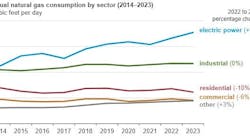Sam Fletcher
Senior Writer
HOUSTON, Mar. 3 -- Front-month crude hit a new high of $103.05/bbl in overnight electronic trading on Feb. 29 before slipping below the previous session's record high closing, pulled down by the falling stock market.
On Mar. 3, the US Department of Commerce said construction spending fell 1.7% in January—its steepest drop in 14 years. The Institute for Supply Management also reported a contraction in US manufacturing during February to the weakest level in 5 years.
"The [equity] market fell 3% on [Feb. 29] and took the energy markets down with it, despite commodity prices [declining] less than 1%," said analysts in the Houston office of Raymond James & Associates Inc. They expect to see a second-quarter build in oil inventories that may dampen short-term prices, though second-half draws should provide further strength later in the year. "Looking to natural gas, we reiterate our bearish summer call, though bullish cold weather and continued short squeezes may bolster prices in the near-term," Raymond James said.
Despite the end-of-the-week decline in energy prices, Olivier Jakob at Petromatrix, Zug, Switzerland, noted West Texas Intermediate increased a total $3.03/bbl during the week, marking the fourth consecutive week for gains of $3-4/bbl. North Sea Brent gained about the same, up $3.09/bbl for the week. The April contract for heating oil "managed to more or less follow with an increase of $2.71/bbl, but RBOB gasoline was stalling and made a loss of 27¢/bbl," he said. Natural gas for April increased 1.9%, "and WTI is up $40.20/bbl from a year ago," Jakob said.
Meanwhile, the Ecuador government on Feb. 29 declared a force majeure on its oil exports after a mudslide ruptured some 80 m of the Trans-Ecuadorian Oil Pipeline System (SOTE) last week (OGJ Online, Feb. 29, 2008). Government officials estimated it would take 3-6 days to repair that pipeline that extends 312 miles from the Amazon region to the port of Balao on the Pacific Coast. That pipeline has a capacity of 390,000 b/d and carries an average of 360,000 b/d, primarily for the state oil company, Petroecuador, which exports about 167,000 b/d. Some 4,000 bbl of crude were spilled by the mishap.
In other news, Noble Drilling Corp. and Transocean Inc. are challenging the Nigerian government's plan to reclassify drilling rigs as ships, which would impose a 2% tax on revenues from those units. That would be "clearly bearish for both companies, but instincts point to resolution as such a move would push available capacity out of the region at a time when Nigerian oil output faces internal problems," Raymond James analysts said.
Energy prices
The April contract dipped by 75¢ to $101.84/bbl Feb. 29 on the New York Mercantile Exchange. The May contract lost 83¢ to $101.42/bbl. On the US spot market, WTI at Cushing, Okla., was down 75¢ to $101.85/bl. Heating oil for March slipped by 0.59¢ to $2.84/gal on NYMEX. The March contract for reformulated blend stock for oxygenate blending (RBOB) gained 1.66¢ to $2.51/gal, however.
The April natural gas contract lost 7.7¢ to $9.37/MMbtu on NYMEX. On the US spot market, gas at Henry Hub, La., increased 1¢ to $9.12/MMbtu.
In London, the April IPE contract for North Sea Brent crude dropped 80¢ to $100.10/bbl. Gas oil for March gained $7.50 to $915/tonne.
The average price for the Organization of Petroleum Exporting Countries' basket of 12 reference crudes escalated by $1.51 to $96.50/bbl. The average price for OPEC's basket of crudes so far this year is $89.63/bbl.
Contact Sam Fletcher at [email protected].
